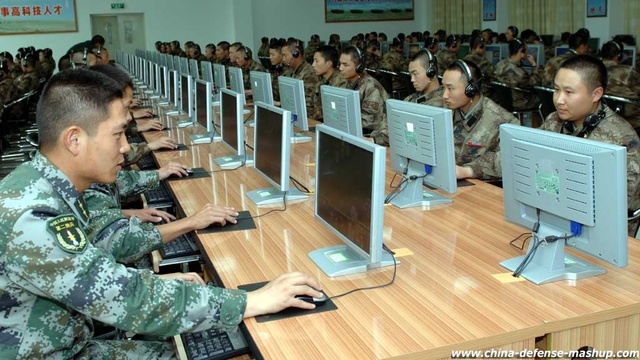A Blueprint To Stop Chinese Espionage, IP Theft: Nick Eftimiades, Top Intel Expert
Posted on

Chinese cyber operators
Few espionage experts speak publicly. Even fewer experts in Chinese espionage do. I first met Nick Eftimiades at the airport when he was a top space intelligence expert. I was en route to my first Space Symposium and knew very little. Nick taught me a bit and was very tolerant of this new space puppy who didn’t know enough to judge what actually mattered. In 1994, his first major public work was published, the groundbreaking Chinese Intelligence Operations, a book done while Nick worked in the Intelligence Community but was entirely based on open sources he assiduously gathered and subjected to classification review. It passed and was released. Since then, the vast majority of Nick’s work has been highly classified. But he’s out in the open now, a lecturer at Penn State Harrisburg and he offers our readers this hard-hitting prescription for how to blunt the massive and persistent efforts by China to steal technology and military secrets from the U.S. and its allies. Dear HPSCI, SSCI, HASC and SASC, let Nick and us know what you think. Read on! The Editor
Twenty years ago, I testified before a U.S. congressional committee on China’s espionage operations in the United States. I left the members with what I thought was an ominous warning: “Do something about this now or you will be calling me back in 20 years screaming: My God, how did this happen?” Well, they never called me back, but if recent FBI arrests are any indication, the problem has gotten worse, a lot worse. The questions US policy makers must now ask is how we got in this situation in the first place and what can be done about it.
How We Got Here

Nick Eftimiades
During the mid-1990s a policy debate on China began in Washington D.C. The debaters included China subject matter experts, Congressional members and staff, and appointed officials in the Clinton administration. The war of words and ideas raged for 20 years through Republican and Democratic administrations. The two camps, nicknamed the Red Team and the Blue Team, argued about the approach to take towards an opening and evolving China. Red Team members argued that China would go the way of all other nations and liberalize politically as their economy developed and the masses were lifted out of poverty. They mistakenly reasoned that China would eventually run into a wall of international lawyers, accountants, and regulators and curb its practices accordingly. Red Team members did not foresee China’s aggressive efforts to dismantle that wall. It was a belief structure the Intelligence Community calls “Mirror Imaging”.
In contrast, Blue Team members argued that the Chinese Communist Party would not give up power and would use its newfound economic wealth to tighten its authoritarian grip and build militarily. The Red Team won the policy debate, but history has shown the Blue Team was correct (Just a note, the Blue Team was founded in my home in Silver Spring, MD in 1994). It is with an odd sense of irony that the Trump Administration has yet to drain the swamp of the Red Team members in political appointments, consultantships, and think tanks still pushing to influence U.S. policy.
The US government has been limited in its response to what has it evolved to be the greatest transfer of wealth in the course of history. Positive change might be coming as the Department of Justice recently announced that the status quo is no longer acceptable. But any changes will likely be hard fought, as estimates suggest China derives 8 percent of its gross domestic product from the illegal theft of intellectual property rights.
First, it is important to recognize that the Trump Administration has been handed a problem that manifested itself over 20 years of failed U.S. China policy. The fixes will not be easy and will not come without cost. But to do nothing will reduce America’s competitiveness and cost millions of American jobs over the next decades. Here’s what we have learned over the last 20 years:
- China has expanded its economic and security related espionage efforts considerably.
- The Chinese Communist Party directs or encourages government agencies, State Owned Enterprises, private companies/individuals, and select universities to conduct espionage activities.
- Nearly half of China’s espionage efforts target U.S. military and space technologies. Almost 25 percent of cases target commercial interests exclusively.
- China is unlikely to significantly curb its economic espionage efforts since they provide a cost-efficient means to expand the economy, advance research and development, project military power and meet China’s stated goals to become a world power.
What Is To Be Done
The response to China’s economic espionage activities and unfair trade practices must be done in the spheres of policy and operations. Congress must act quickly as China, and no doubt U.S. persons with vested financial interests, will try and slow any policy changes in hopes of a different presidential administration — and a return to old policies — in 2020. Current U.S. law enforcement operations alone will be of limited value if there is a change in presidential administration with a different policy approach in 2020.
Policy Options
The Trump Administration must reach out to our closest allies to build a coordinated effort to combat economic espionage. An assertive enforcement approach only in the U.S. would just shift the problem to high-tech industries in Japan, the United Kingdom, France, Australia, and Germany. Each of these countries have already been victims of China’s cyber and economic espionage efforts. In a globalized world, China’s advanced military and space/counterspace technology still remains a U.S. problem. Coordinated international efforts should include establishing an international countries working group. A good place to start would be with FVEY — Five Eyes — plus Japan, France and Germany to do the following:
- Law enforcement information sharing
- Intelligence sharing
- Coordinated cyber investigations and operational responses
- Cyber security information sharing
- Coordinated diplomatic responses to China’s economic espionage actions
Deterrence Measures
Deterrence is also another key objective that might be achievable by policy. Strategists often claim deterrence is difficult to obtain or even understand in the cyber world. However, deterrence is achievable against individuals who conduct economic espionage and theft of trade secrets in the U.S. How? The current administration seeks to implement enhanced screening of Chinese students and scholars coming to the United States. The process will not likely be effective in determining the future course of action for individuals.
Figure 4 Adapted from Office of the Director of National Intelligence,
However, deterrence at an individual level would probably dissuade some people from committing economic espionage. Any person coming to the United States to study or work in a critical high-tech field should be presented with a document notifying them of the severity of economic espionage and harsh penalties. This one page document could easily be part of one’s immigration submission package. The reason this document is important is that Chinese culture does not recognize the law as a binding contract in society the way it is in the West. Also, most people do not understand the severity of shipping technology overseas. It is easy to buy a laptop computer and mail it overseas and not realize you have committed a felony.
No Fly List for Cyber Hackers
We have a No Fly list for those even remotely suspect of being affiliated with a terrorist organization. Why not implement a similar list for foreign nationals implicated in cyber espionage? They need not be convicted. They need not be indicted. And in China, Netizens branding themselves as “Red and Patriotic” brag online and in the media about attacking and defacing Western targets on behalf of the PRC. Beijing has repeatedly said they have no control over these individuals and that they are acting on their own. The U.S. should establish No Fly criteria with allies and refuse those people travel anywhere possible. We may struggle to stop their cyber efforts from China but we can ensure their travel is limited.
A similar process for No Fly travel can be used against Chinese companies conducting economic espionage. If a Chinese company is convicted in any country of economic espionage, IPR violations, etc. it could face costly penalties or restrictions from all allies. If plausible, a united policy response will likely be more effective than that of any single nation.
Figure 3 Distribution of Chinese Espionage Cases in the United States
Operations
Law enforcement must implement interagency multi-jurisdictional task forces to bring the complete range of investigative and enforcement authorities to bear on foreign actors. The current Justice Department effort will lessen other investigative and prosecutorial opportunities. A joint effort would provide an integrated approach to disrupt China’s espionage activities which generally fall into one (or more) of five categories: Traditional espionage (18 USC 792-799), Economic Espionage Act of 1996; Illegal Exports (Export Administration Regulations and International Traffic in Arms Regulations) and violation of the Foreign Agents Registration Act (18 USC 951).
Conclusion
Rectifying Chinese Behavior in conducting economic Espionage and theft of Trade Secrets will not come easy. It is a problem that US policy has allowed to manifest and grow for 20 years. At this point it derives 8 percent of its gross domestic domestic product from intellectual property theft. Its economic growth and military advancement is dependent on theft.
Fixing this problem will not be easy, but it is can be done. Changing policy may allow us to curb China’s thefts at minimal cost. The Trump Administration and the US Congress has two years to design and Implement these changes. Beijing and vested commercial interests will do everything possible to delay and derail these efforts. We must persist.
Subscribe to our newsletter
Promotions, new products and sales. Directly to your inbox.
